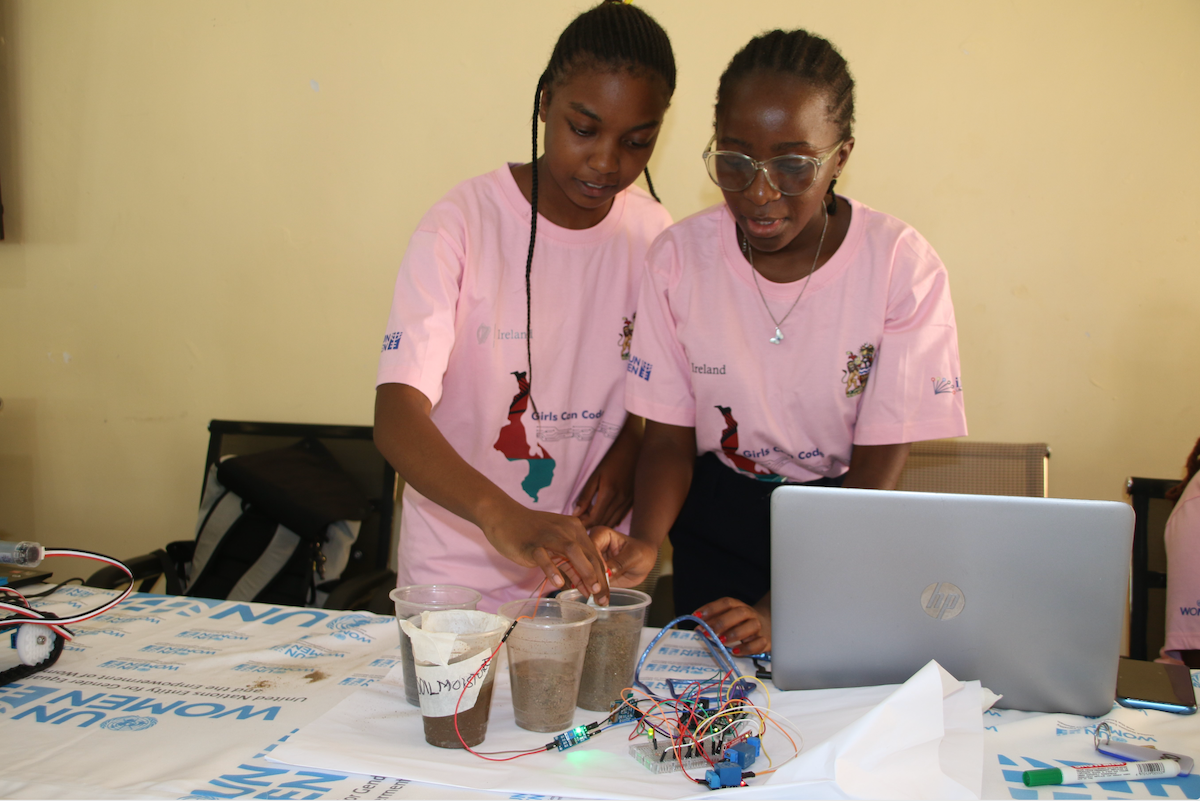Bridging the digital divide: Empowering girls through innovation in Malawi
Date:

In a pioneering effort to bridge the gender digital divide, nine innovative e-learning hubs have been established in schools in rural and urban areas across Malawi, marking a transformative chapter for young women and girls in technology. These hubs, strategically located in Mvera, Dowa, and Natola secondary schools in central Malawi, Mpilisi and Balaka Secondary Schools in the southeast, and Euthini, Mzimba, Nkholongo, and Katoto schools in the northern region, are set to change the educational landscape. These hubs have welcomed a total of 360 students—an inspiring 252 girls and 108 boys —as part of a bold initiative to create a more equitable digital future.
Launched in May 2024, the first cohort of students embarked on their journey into the world of coding and digital literacy. With the course divided into three progressive levels, the students have already reached the halfway mark, absorbing knowledge that could change their futures.
In Dowa Secondary School, both girls and boys are thriving. They’re not just learning to code; they’re uncovering ways to use technology to advance their education and fuel their entrepreneurial dreams. One such student, Rachel Chauluka, shared her excitement during an interview with a local community radio, Dowa FM. “Through Malawi Girls Can Code,” she said, “I have learnt how to create a website, in future it will help me make money because I can advertise my products and sell using a computer.” Another student, MacDuff Chinsanzo who is equally passionate about digital learning, emphasized his commitment to gender equality in tech and his newly acquired skills in protecting women online from discrimination “Through this initiative, I have the confidence that I can create an app that girls like my younger sister can use to report cyberbullying and feel safe” said Chinsanzo, “importantly, now I know how to discourage cyberbullying”. Dorothy Kennedy, a third-year student said the sessions “helps us understand gender, as most women are not represented in ICT, the sessions are opening up our minds so that in future we can be role models. We can teach our friends in rural areas too,tech learning shouldn’t end here” she says.
Meanwhile, in Balaka in southern Malawi, the MGCC2 project is making waves with the establishment of two e-learning hubs at Balaka Secondary School and Mpilisi School in a remote area. Each school has enrolled 40 students, with girls making up seventy percent of the group. Despite initial setbacks due to poor internet connectivity, Mpilisi CDSS has seen remarkable improvements. Through UN Women support, the installation of solar power and internet has turned things around, providing a reliable learning environment for both students and teachers. With a stable internet connection and a fully functional computer lab, the school is now equipped to offer the digital education its students deserve.
Balaka Secondary School has already achieved notable successes, with students like Nifa Mliya, a 15-year-old girl, expressing her newfound love for creating animations through Scratch, a coding software. Carolyne Synod, 17, is equally enthusiastic, seeing Malawi Girls Can Code as a stepping stone to pursuing ICT programs at tertiary level.
The initiative has not only provided cutting-edge technology but also created inspiring learning spaces. Jean Mhango, a student from Nkholongo School in the north of the country said “the way the room are designed, makes it easy to be creative. Here, learning is not just educational—it’s also fun”. These vibrant, secure, and well-equipped spaces are designed to motivate students, especially girls, as they delve into the world of coding.
The e-learning hubs are more than just classrooms; they are gateways to a brighter future for girls in Malawi, breaking down barriers and proving that when given the right tools, the next generation of girls can lead the way in digital innovation.